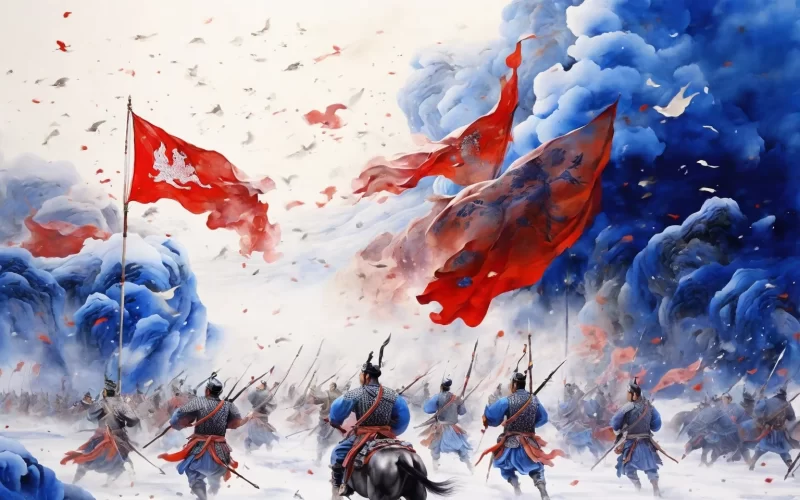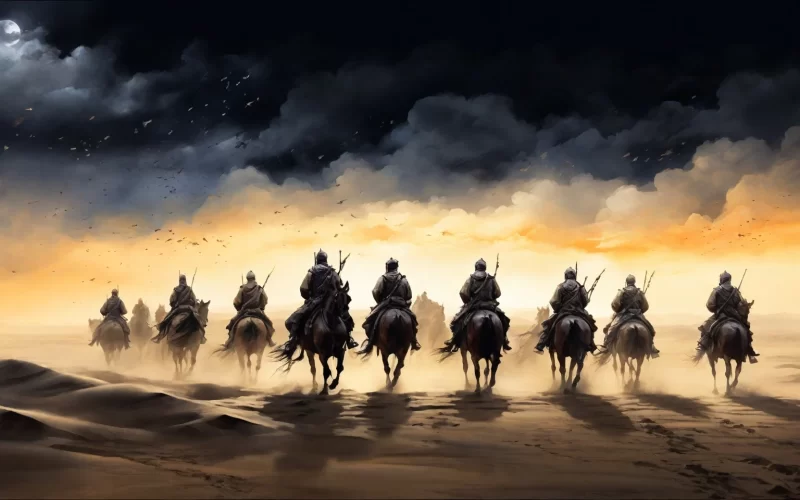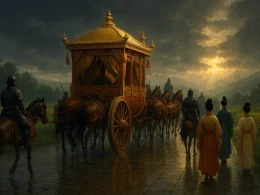Clouds on frontier overshadow mountains clad in snow;
A lonely town afar faces Pass of Jade Gate.
Our golden armor pierced by sand, we fight the foe;
We won't come back till we destroy the hostile State.
Original Poem:
「从军行 · 其四」
王昌龄
青海长云暗雪山,孤城遥望玉门关。
黄沙百战穿金甲,不破楼兰终不还。
Interpretation:
This is a frontier poem written by Wang Changling, a poet of the Tang dynasty. In this poem, Wang Changling portrays the ambitious spirit of soldiers stationed at the frontier and showcases the harshness of the borderlands and the cruelty of warfare. During the Tang dynasty, the frontier areas were often embroiled in conflicts, particularly over the region around Qinghai and the Yumen Pass, which became the focal point of the wars. Through this poem, Wang Changling not only describes the desolation and grandeur of the borderlands but also reflects the indomitable fighting spirit of the soldiers stationed there.
Upper Couplet: “青海长云暗雪山,孤城遥望玉门关。”
(Dark clouds cover Qinghai Lake, with snow-capped mountains faintly visible in the distance. Beyond the mountains lies a solitary city, and to the west, one can see the Yumen Pass.)
This couplet illustrates the vastness and desolation of the frontier landscape. The geographical span of Qinghai, the snow mountains, and the Yumen Pass is immense, yet the poet seamlessly integrates these features into a unified image, painting a majestic and bleak picture. Through these geographical features, the poet not only portrays the desolation of the northwest frontier but also reveals the soldiers’ hardships and their deep commitment to defending the border.
Lower Couplet: “黄沙百战穿金甲,不破楼兰终不还。”
(Amidst the endless yellow sand, the golden armor of the soldiers, worn through countless battles, vows to never return until the city of Loulan is captured.)
This couplet centers on the heroic oath of the soldiers, depicting the hardships of long-term border defense and the brutality of war. "黄沙百战穿金甲" encapsulates the frequency and difficulty of the battles, while "不破楼兰终不还" conveys the soldiers’ unwavering resolve to protect the nation and their homeland. The determination and heroism in these lines highlight the brave spirit of the frontier soldiers.
Characteristics of the Poem:
- Grand Spatial Layout: Wang Changling uses the place names of Qinghai, the snow mountains, and the Yumen Pass, bringing them together in a single scene, breaking down geographical distances and linking the vast northwest frontier with the soldiers’ grand ambitions.
- Integration of Scene and Emotion: The environmental descriptions in the first two lines contrast with the heroic vows in the latter lines. The vast natural landscape emphasizes the isolation and harshness of the frontier, while the soldiers' resolve shines through this backdrop.
- Concise and Powerful Language: The poem is marked by its succinct yet forceful language. It not only conveys the grandeur of the scenery and the harshness of the environment but also expresses the soldiers' tenacity and unwavering determination. The line "黄沙百战穿金甲" vividly captures the hardship of life at the frontier and the cruelty of battle.
- Profound Emotional Expression: In depicting the harsh life on the frontier, the poet infuses the description with deep emotion, closely intertwining the environment with the soldiers' feelings, enhancing the emotional power of the poem.
Overall Appreciation:
Through its concise language and vivid imagery, this poem depicts the grandeur and desolation of the northwest frontier, as well as the bravery and resilience of the soldiers stationed there. Wang Changling’s detailed portrayal of the natural scenery reveals the brutality and solitude of the desert battlefield, while the soldiers' oaths and determination stand out as bright points in this bleak setting. The poem exemplifies the typical style of frontier poetry, not shying away from the hardships of war, while deeply expressing the heroic spirit of the soldiers. It is one of the representative works of the prosperous Tang dynasty frontier poetry.
Insights:
This poem not only portrays the soldiers’ hardships and isolation while fighting at the frontier but also reflects their steadfast resolve and heroic spirit in the face of adversity. Through their oaths and passionate resolve in the poem, we draw strength in the form of fearlessness and courage to move forward. When faced with challenges and difficulties, maintaining one’s faith and persevering is of utmost importance. The dedication and loyalty to their mission, as depicted in the poem, is an attitude that everyone should uphold when facing difficulties in life.
Poem translator:
Xu Yuan-chong (许渊冲)
About the poet:

Wang Changling (王昌龄), circa A.D. 690 - 756, was a native of Xi'an, Shaanxi Province. Wang Changling's poems were mostly about the Border Places, love affairs and farewells, and he was well known during his lifetime. His seven poems are equal to those of Li Bai, and he is known as the “Master of seven lines”.












